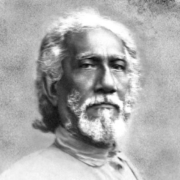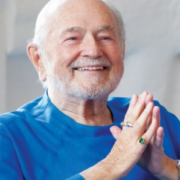I was really pondering on this topic. whenever we use the word ‘versus’, – it means that in our spiritual path as we ascend, they are two different things, which ideally it should not be.
As Jesus emphasized repeatedly the Spirit, not the letter of the law. Even Swami Sri Yukteswarji in the Autobiography of a Yogi says, not the literal interpretation of the scriptures is what the Masters are asking of us, or God is asking of us. We have to see where we are, how we can apply them and we try to do our best. Yes we are bound to make mistakes, and like Yoganandaji said God doesn’t mind your faults but he does mind your indifference.
Why does it happen that we say something and we do something else. It’s the story of every disciple or every devotee or perhaps of every human being. We think that we’re going to do a certain thing, “I will meditate this year ….” Yet when it comes to the actualization of the intention there is often a gap.
The ego is a very interesting and a tricky subject. Very often, our intentions are not necessarily driven by what comes through the Gurus. It is usually colored by likes and dislikes. Hence the intention is somewhat colored, it’s somewhat clouded, and hence the deed doesn’t quite materialize.
 Whereas in the case of these great Masters, their will is so tuned into the Divine will that everything they do is in harmony with what God and Divine mother want them to do. For example, Yoganandaji was once driving in Los Angeles and while driving he asked his disciple to stop the car and he said “I want to get some short bread from this bakery.” The disciple went in and asked for shortbread. The proprietor said “we don’t have shortbread.” Yoganandaji was surprised. He said “Divine Mother, how come?”
Whereas in the case of these great Masters, their will is so tuned into the Divine will that everything they do is in harmony with what God and Divine mother want them to do. For example, Yoganandaji was once driving in Los Angeles and while driving he asked his disciple to stop the car and he said “I want to get some short bread from this bakery.” The disciple went in and asked for shortbread. The proprietor said “we don’t have shortbread.” Yoganandaji was surprised. He said “Divine Mother, how come?”
 It might seem like a very little thing but he was so much in tune with what God and Gurus wanted him to do, what Divine Mother wanted him to do. It didn’t matter if Divine Mother would have told him to stop the car and pick some stones, he would have done that. When he said “Divine mother, how come” at that very moment there was a shaft of light which fell on that bakery, and the proprietress came out and she said “Wait, I have some shortbread. I was saving it for my other customers, but I think you should have it. I can bake a fresh batch for them.”
It might seem like a very little thing but he was so much in tune with what God and Gurus wanted him to do, what Divine Mother wanted him to do. It didn’t matter if Divine Mother would have told him to stop the car and pick some stones, he would have done that. When he said “Divine mother, how come” at that very moment there was a shaft of light which fell on that bakery, and the proprietress came out and she said “Wait, I have some shortbread. I was saving it for my other customers, but I think you should have it. I can bake a fresh batch for them.”
It was so subtle that even in something as simple as a shortbread, a cookie, the intention was not his own. it was like okay Divine mother wants me to do this, and then the deed was done. And because it was so much in tune it happened, even though it seemingly seemed like it may not happen.
At the same time when we sometimes, try to have our “intention,” we fail to listen or ask the Masters “what do you want?” It’s usually “I want this.” So ego is one important factor and the big reason why we intend to do something and then we are unable to do it.
Often times what also happens is that we try and hold the standard too high and we are somewhere else. For example, about anger Jesus was saying, that there’s a thought that because I’m spiritual hence I cannot be angry. Or, I’m not angry, even when I’m angry. There’s a certain level of denial in that case and hence what happens is that we intend to say I’m not angry, but in Deeds we are not accepting it.
I was speaking to a sister disciple and she said “you know, I woke up this morning and I was very angry, because it’s so hot and I didn’t feel good about it.” Well, better to say that rather than “you know, it was very hot and yet because I’m spiritual, it was all okay.”
And if somebody comes in front of this person and they say something which is out of tune, the could even throw a punch at them and say “I’m not angry. You just deserved a punch.” So in these situations it’s better to be self-honest.
That is another thing that is very important on the spiritual path: to see where we are, where I am, instead of saying the scriptures say so, thus I am so.
It would be better to say that the scriptures say that I should not be angry, and right now I do a little bit of that. It’s okay. I will invite God and Gurus to make up for the deficiencies that I have in me.
Again, just to recall that God doesn’t mind our faults, he does mind our indifference. Indifference can sometimes even be like “I don’t have issues. I’m completely fine. I am perfect. I’m just one step away from Sabikalpa or Nirbikalpa Samadi.”
But that doesn’t mean that we say okay fine this is how it’s going to be. This is who I am and I cannot change. Of course not. We want to keep the highest where it is but also be realistic of where we are. And then invite God and say I cannot meditate three hours a day. I cannot meditate maybe even two hours a day. But what can we do together? And then set the intention and then try to do our best. And if that doesn’t work out, check in with the Masters: what do you want me to do, how shall we proceed from here?
 Jesus Christ emphasized repeatedly the Spirit not the letter of the law. In accounting we have a term called substance over form. It doesn’t matter what the physical form is but what does it hold in truth. For example, when we were driving and coming there was a no entry sign. That’s the form. But everybody was driving right through it and that’s the substance, that’s the Spirit. In this case, what is the Spirit is more important.
Jesus Christ emphasized repeatedly the Spirit not the letter of the law. In accounting we have a term called substance over form. It doesn’t matter what the physical form is but what does it hold in truth. For example, when we were driving and coming there was a no entry sign. That’s the form. But everybody was driving right through it and that’s the substance, that’s the Spirit. In this case, what is the Spirit is more important.
Coming to Ahimsa: This is from the Autobiography of a Yogi: “it was the gentle hour of dusk,” Yoganandaji writes, “my Guru was matchlessly interpreting the ancient texts. At his feet I was in perfect peace. A rude mosquito entered and competed for my attention. As it dug a poisonous hypodermic needle into my thigh, I automatically raised an avenging hand.
 Reprieve from impending execution! An opportune memory came to me of one of Patanjali’s yoga aphorisms- that on ahimsa (harmlessness). Sri Yukteswarji asked “why didn’t you finish the job?” “Master! Do you advocate taking life?” “No,” Sri Yukteswarji replied “but the deathblow already had been struck in your mind.”
Reprieve from impending execution! An opportune memory came to me of one of Patanjali’s yoga aphorisms- that on ahimsa (harmlessness). Sri Yukteswarji asked “why didn’t you finish the job?” “Master! Do you advocate taking life?” “No,” Sri Yukteswarji replied “but the deathblow already had been struck in your mind.”
“I don’t understand,” Yoganandaji said. “Patanjali’s meaning was the removal of the desire to kill.” Sri Yukteswarji had found my mental processes an open book.
“This world is inconveniently arranged for a literal practice of ahimsa. Man may be compelled to exterminate harmful creatures. He is not under similar compulsion to feel anger or animosity. All forms of life have equal right to the air of Maya. The saint who uncovers the secret of creation will be in harmony with its countless bewildering expressions. All men may approach that understanding who curb the inner passion for destruction.”
We see in the practice of ahimsa and that holds true for every Yama and Niyama which we learn in Patanjali’s ashtanga yoga, whether it be harmlessness, non-lying, or brahmacharya (non-sensuality), or anything for that matter is what is the spirit behind it, because we cannot literally follow each and every law.
It’s hard to follow the law onto the word, but again what is the spirit behind it. In this case, at least we know the spirit is to be harmless, to be loving, to be kind, the spirit is whatever Divine qualities these great Saints have manifested in our lives.
 As Swamiji writes ‘thus through Holy scripture, God has spoken to mankind.” Let us see behind the Holy Scripture; the vibration behind the Holy Scripture and what it’s really trying to say. How does it apply in my life. How can I take the next step. It might be a bit too high but we can put one foot in front of the other and hopefully at one point, not hopefully – this is the Divine promise we all are given, that our ultimate Destiny is to be one with them. To merge with them. Let’s keep listening to them and then see if it is Deeds versus Intention or if it is Deeds AND Intention.
As Swamiji writes ‘thus through Holy scripture, God has spoken to mankind.” Let us see behind the Holy Scripture; the vibration behind the Holy Scripture and what it’s really trying to say. How does it apply in my life. How can I take the next step. It might be a bit too high but we can put one foot in front of the other and hopefully at one point, not hopefully – this is the Divine promise we all are given, that our ultimate Destiny is to be one with them. To merge with them. Let’s keep listening to them and then see if it is Deeds versus Intention or if it is Deeds AND Intention.
Thank you. God bless you all.
This blog has been taken from a transcribed talk of Brahmachari Vasudeva. You can watch the talk here https://youtu.be/BnjPZAyAI-A?si=ldO7u02PdpDtdEd2
3 Comments
MEYJYTJY388981MAERWETT
Namaste i have a question ,do you know if there is a satsangh place in Belguim.I am situated in Belguim.
Thanking you in advance
Neela Mootien
Hello! Thank you for your question, but since this is Ananda India we are note quite sure. Perhaps you could explore our website – anandaeurope.org or ananda.org and they would be able to guide you on this! 🙂